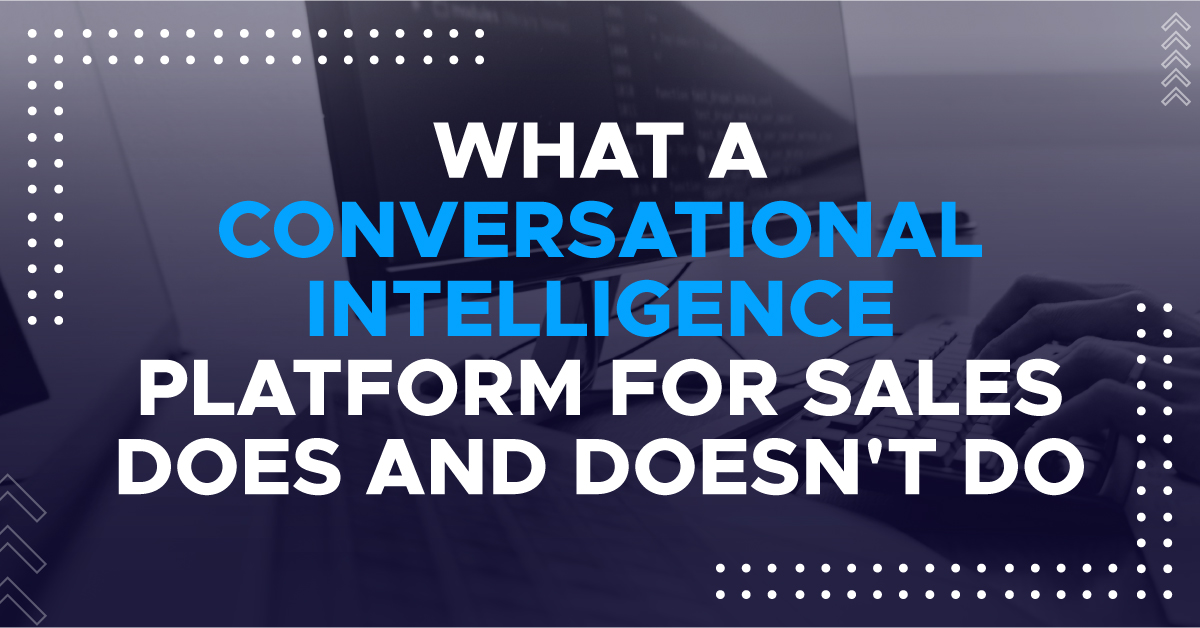Weaknesses of Conversational Intelligence
“We have a new initiative” are the five words that no salesperson ever wants to hear. I remember the first time that a VP of sales brought me the sort of messaging along with software that was intended for recording my conversations.
His heart was really in the right place, but the execution left something to be desired.
Over the next three months, we rolled out essentially a call recorder that allowed our sales teams to go back and listen to our calls.
Unfortunately, we also spent hours and hours going over our calls together instead of spending time on critical items like prospecting.
He wasn’t alone.
Many leaders and great companies today are either looking for or using the next “big” conversational intelligence platform for sales. In reality, they are more than likely using a combination of recording and maybe analytics software that has been around for years (ok… maybe more than a few years… actually – it’s been around since at least 1903).
So how is this piece of conversational intelligence so revolutionary?
The goal behind sales call intelligence
The common goal behind sales call intelligence is to help salespeople perform better. Tactically that means that salespeople need to be able to execute talk tracks in a more productive way so that their conversations go better so they close more deals. Depending on the industry where sales call intelligence is being used, there could be several other factors like reducing the amount of cursing, or clueing in when I conversation has gone terribly wrong. But for the most part, it is used to reconstruct what has happened on calls to gauge at a macro and microscopic level how the salesperson is performing. That’s it! Sales call intelligence has a primary goal of gauging rap performance and can help to provide insights so that coaching of smoothly and performance can be maximized.
What sales call intelligence does
The way that performance is tracked and maximized for salespeople using sales call intelligence today is by using sales call intelligence software to record the calls the reps are making and many times helping both reps and managers by providing a transcript. Managers will go back and listen to the call, make notes for the rep, and maybe even have a conversation or one-on-one with the rep to discuss how to do better next time. Some software even allows the documentation of this conversation to show the progression or digression of the salesperson. Being able to show improvement or the lack thereof is oftentimes used to discipline the salesperson for poor performance, very rarely is it used to celebrate the salesperson in any capacity… it’s just not designed to be collaborative or used in a way that benefits the salesperson. Either the salesperson does their job well and the conversational intelligence software validates this, or they need improvement and the same software validates where to make improvements and documents this for future use by leadership, HR oh, and the salesperson.
What sales call intelligence isn’t doing
The key piece being missed by most conversational intelligence software is the ability to actually help the rep in real-time. Every piece of this technology is pointed at what the rep could have done better, or what they did correctly. Being able to help the rep on an actual call is not possible because the focus of sales call intelligence software is really on fixing the problem inside of the employee after the fact. So while most software platforms based around conversation intelligence will allow you to have really great recollection and even amplify your capabilities around coaching, none of them will actually help a rap in real-time to nail the conversation in the first place.
The solution?
The solution to these challenges is the same solution as any other technology ever built – incremental improvements aimed at solving a more core problem. For example, the first iPhone did not invent cell phones, but it did solve the problem that cell phones were primarily used for voice-to-voice conversation.
Similarly, Abstrakt did not invent the conversational intelligence platform for sales, but Abstrakt did create a way to empower salespeople with managers and put them while they are live on calls so that they can nail the conversation every time without having to go back and find out what they did wrong.
Obviously, this does not replace traditional call coaching, but it can go a long way in making sure that the right words are said in the right order to get the right outcomes and therefore will help increase the outcome of the rep’s performance.
While keeping in mind that the original goal of sales call intelligence software is to increase performance, we think it’s a good idea to start doing that when the prophet is still on the phone.
